Resin-bound gravel stands out as an ideal choice for hilly gardens and driveways across the UK. The surface drains rainfall efficiently, much like a natural filter, preventing water pooling common with traditional paving. Its robust structure handles regular vehicle use whilst adapting to ground movement – particularly useful during British winters when soil expands and contracts. The finish comes in various colours and styles to match period properties or modern homes alike. Most importantly for our wet climate, the non-slip surface provides steady footing on slopes, even during downpours. The system’s eco-friendly credentials and minimal upkeep requirements make it a practical long-term investment.
Key Takeaways
The Benefits of Resin-Bound Gravel for Hilly Gardens
- Superior drainage prevents water pooling and flooding – particularly handy during Britain’s wet seasons and on sloped ground.
- Built-in grip makes the surface far safer than traditional paving, especially useful on garden paths and driveways that slope.
- Water filters straight through to the soil beneath, stopping rain from washing away the ground on steep areas.
- Once laid, it’s remarkably tough and needs little upkeep – ideal for difficult-to-access hillside spots.
- Comes in various colours and finishes to match your garden’s natural slopes and existing landscaping.
Draining Properties of Resin-Bound Gravel
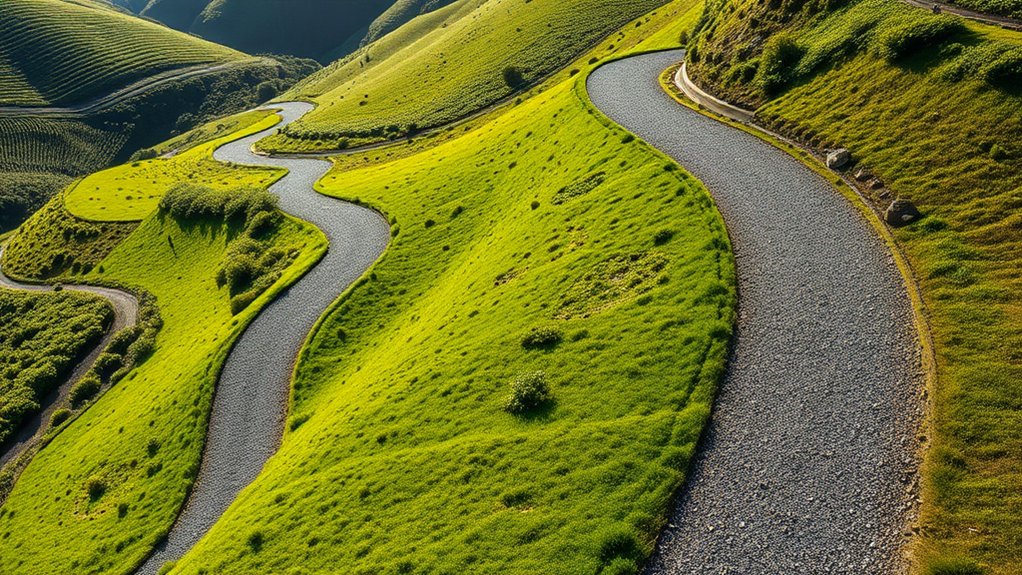
Resin-bound gravel offers excellent drainage properties, making it a practical choice for British weather conditions. The highly permeable surface allows rainwater to filter through quickly, reducing surface flooding and puddle formation. This naturally helps replenish groundwater and takes pressure off local storm drains – particularly useful during heavy downpours common in the UK. The system works like a natural filter, trapping pollutants before they enter the soil, which benefits the local environment. For properties with slopes or uneven ground, this surface prevents water pooling and the associated slip risks. The material’s porous nature, combined with proper installation, ensures reliable drainage year-round, making it an environmentally sound choice for driveways, paths and patios. Additionally, proper drainage is crucial for preventing water accumulation and surface damage, further enhancing the durability of the resin-bound surface. This permeability helps support Sustainable Urban Drainage Systems (SuDS), integral to managing excess rainwater effectively.
Durability and Maintenance Benefits

Resin-bound gravel delivers exceptional durability, lasting up to 30 years with minimal fuss. The surface handles daily wear brilliantly, whether it’s frequent car traffic or steep driveways, and won’t crack or shift like traditional gravel. You won’t need to spend weekends raking loose stones or fixing patches – just an occasional sweep and wash keeps it looking smart. For UK homeowners, this practical choice means less time on upkeep and more money saved on repairs over the years. Additionally, its proper drainage systems ensure that water is effectively managed, preventing issues related to erosion and pooling. Moreover, the porous structure of resin-bound gravel aids in maintaining a stable surface by allowing rainwater to penetrate the ground without causing erosion.
Long-lasting Performance
Resin-bound gravel stands out for its exceptional durability, particularly on steep driveways and sloped gardens. With proper installation, these surfaces typically last 20-30 years – far longer than traditional options like loose gravel or tarmac.
The strong bond between resin and stone creates a stable surface that handles British weather brilliantly, from winter frost to summer heat, without cracking or breaking down. Additionally, this material is designed to be highly durable, making it an excellent investment for long-term use. Resin-bound surfaces also excel in effective drainage, aiding in the management of heavy rainfall.
Unlike loose gravel that tends to scatter and create dips, resin-bound surfaces stay firmly in place, much like your garden patio but with better grip. The material flexes slightly with ground movement, preventing the potholes you’d often see in concrete or block paving.
Think of it as similar to a well-laid kitchen floor that maintains its look and function for decades.
This reliability means fewer repairs and less maintenance, making it a practical choice for UK properties where weather-resistant, long-term solutions are essential.
Low Maintenance Requirements
Resin-bound gravel stands out as a low-maintenance option for sloping gardens and driveways.
It needs minimal upkeep – just occasional checks and simple cleaning. The British weather actually helps, as rain naturally washes away most dirt.
For routine care, a quick sweep with a stiff brush and water does the job brilliantly. Best avoid harsh cleaning products, as they might harm the resin.
Whilst you might spot the odd weed now and then, they’re easy to remove, and a gentle pressure wash once or twice yearly sorts out any stubborn grime.
Keep an eye on drainage and don’t park heavy machinery on it, and your resin-bound surface should stay looking smart with hardly any fuss.
Versatility in Design Options
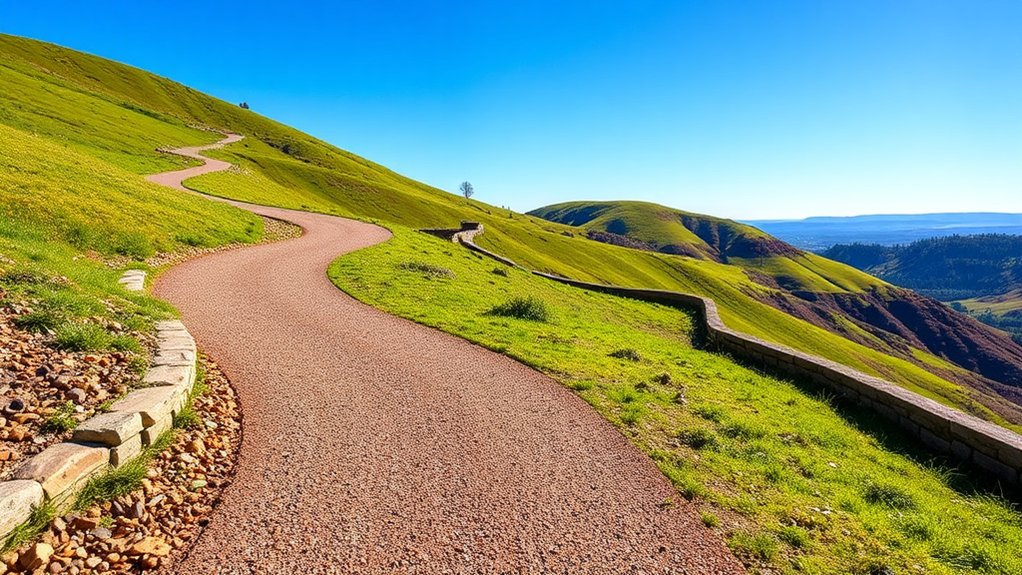
Resin-bound gravel offers countless design options to transform your outdoor space.
Create eye-catching patterns, house numbers or lettering that give your property a modern edge. Different coloured borders and aggregate combinations make pathways stand out, whilst bespoke designs add a personal touch.
For businesses, company logos can be incorporated to boost kerb appeal. Choose from natural stone looks or bold colours – the range of aggregates available means you’ll find the perfect match for your taste.
Mixing different aggregates creates depth and texture, turning standard surfaces into striking features that enhance any garden or driveway.
Environmental Advantages
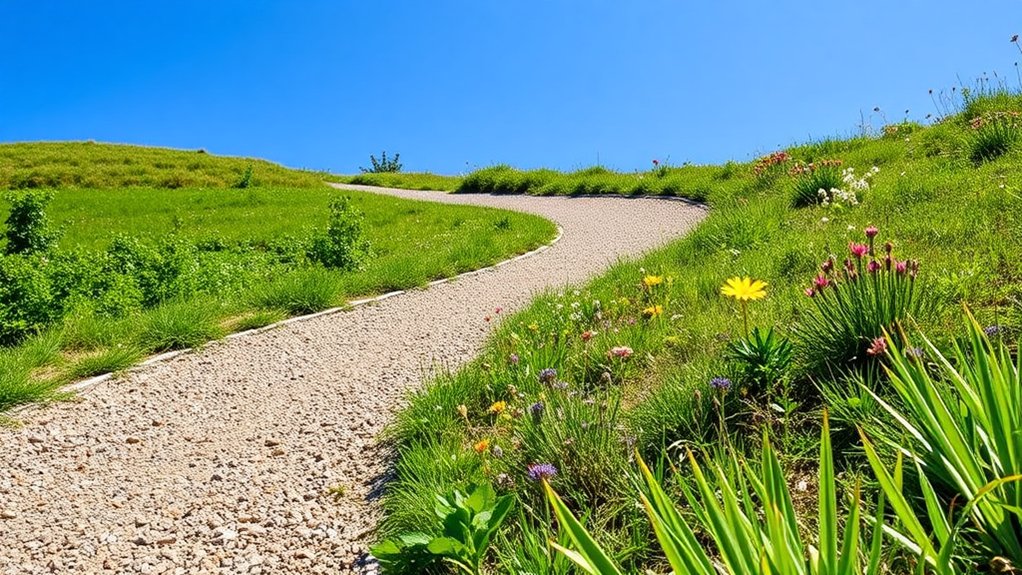
Resin-bound gravel offers significant environmental benefits compared to traditional paving options. Its porous structure naturally drains rainwater, which helps prevent flooding and surface water build-up – a common issue in British gardens and driveways.
The system works like a natural filter, cleaning water as it passes through whilst replenishing groundwater levels. The material’s stability helps prevent soil erosion, particularly useful on slopes and in areas with heavy rainfall.
It’s fully compliant with Sustainable Urban Drainage Systems (SUDS), making it an excellent choice for modern developments and home improvements across the UK.
Unlike concrete or tarmac, resin-bound surfaces require minimal upkeep and produce fewer carbon emissions during installation. This environmentally sound option helps reduce pollution whilst maintaining a safe, practical surface for vehicles and pedestrians.
Technical Specifications Overview

Getting resin-bound gravel right on slopes means sticking to key specs.
You’ll need 18-20mm thickness for driveways and 15mm for paths – though this varies with how much traffic they’ll take.
Choose aggregates between 1-10mm, coated in UV-resistant resin to stop fading in the British weather.
The mix should look natural whilst letting rainwater drain through, crucial for our wet climate.
Your base layer must be spot-on, using materials that stay put and handle water properly.
For safety on slopes, make sure the surface has enough grip – particularly important given our changeable weather conditions.
Cost Considerations and Value

The cost of resin-bound gravel for sloped gardens requires careful consideration.
Whilst pricier than concrete at the outset, its lasting durability and minimal upkeep often prove cost-effective over several years.
Many UK homeowners find the initial expense worthwhile, particularly when factoring in the reduced need for repairs and maintenance typical with traditional paving solutions.
Consider your budget alongside the practical benefits to determine if it’s right for your garden.
Upfront Investment Analysis
Cost Analysis: Resin-Bound Gravel for Sloped Gardens
Installing resin-bound gravel on sloped landscapes requires careful budget planning. Key costs include:
- Material Costs: £55 to £85 per square metre, varying with ground preparation requirements.
- Labour Costs: Skilled installers typically charge £25 to £35 per hour.
- Slope Considerations: Hilly areas add roughly £15-20 per square metre for specialist equipment and extra preparation work.
A typical suburban driveway of 50 square metres might cost between £3,000 and £4,500, depending on slope severity.
Think of it like tiling a bathroom – the steeper the surface, the more complex and costly the job becomes.
These costs reflect real installation challenges on slopes, but proper planning ensures value for money in both looks and function.
Most homeowners find the investment worthwhile, particularly as it lasts 15-20 years with proper maintenance.
Long-Term Financial Benefits
The initial cost of resin-bound gravel might seem steep, but it’s a sound investment that pays off. With a 25-year lifespan and little upkeep needed, it delivers significant savings compared to traditional surfaces.
You won’t face the usual headaches of cracking or weeds pushing through, which means fewer repair bills down the line.
Basic maintenance is straightforward – just sweep with a soft brush and give it an annual power wash. Thanks to its UV-stable properties, the surface keeps its good looks without needing frequent touch-ups.
When weighing up the costs, consider that a typical gravel driveway needs regular top-ups and weed treatment, whilst resin-bound stays put and tidy.
Over time, these reduced maintenance costs add up to substantial savings, making it a particularly clever choice for tricky hillside areas.
Safety Features for Slopes
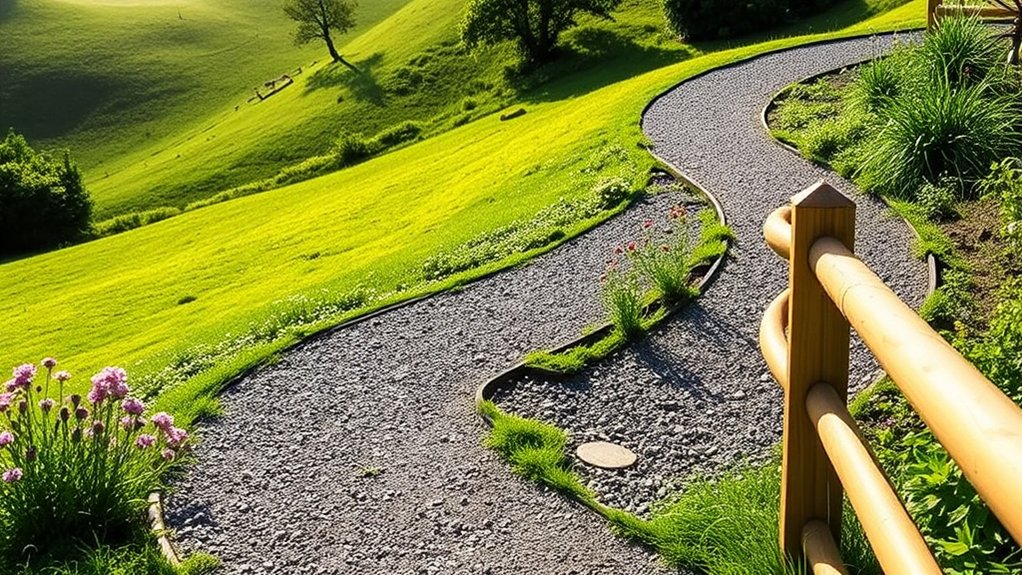
Safety Features for Slopes
Essential safety measures for resin-bound gravel on slopes ensure proper grip and stability in British weather conditions:
- Anti-Slip Aggregates: Crushed glass or quartz mixed into the surface provides extra grip – particularly useful on steep garden paths or driveways.
- Seamless Finish: A properly levelled surface with consistent texture offers reliable traction, even during typical UK rainy spells.
- Permeability: Water drains straight through the surface rather than pooling, reducing the risk of slips on steep areas.
These features prove especially valuable for typical British residential settings, from sloping front gardens to stepped pathways.
Aesthetic Appeal and Customization
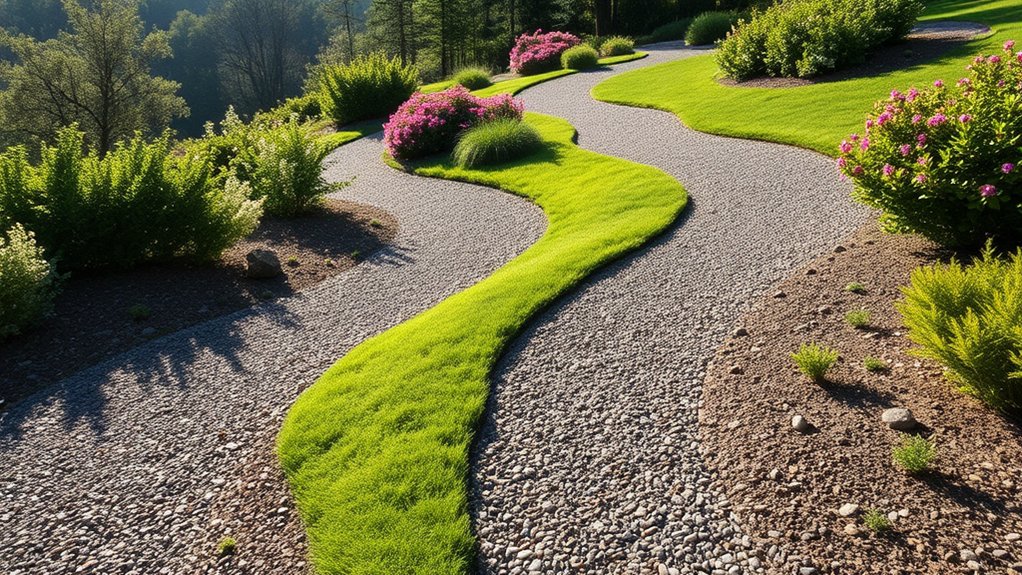
The colour choices for resin-bound gravel offer fantastic scope to match your hillside garden’s look, whether you fancy a bold statement or a natural finish.
Mix different stones and aggregates to create distinctive patterns – think warm golden gravels for a Mediterranean feel or slate-grey blends to complement modern homes.
The beauty is in how adaptable these surfaces are, working brilliantly with the natural contours of sloping gardens whilst looking smart and purposeful.
Color Variety Options
Resin-bound gravel comes in a vast range of colours, perfect for enhancing any garden or driveway. The colour options available in today’s market include:
- Natural Stone Colours: Earth tones like Yorkshire Buff and Cotswold that suit traditional British homes.
- Grey & Black Tones: Popular choices like Charcoal and Slate Grey, ideal for modern properties.
- Mixed Blends: Combinations such as Thames Blend or Highland Mix that complement local architecture.
The colour variety lets you match your existing property features – whether it’s the brickwork of a Victorian terrace or the clean lines of a contemporary build.
For practical choices, darker shades work well in high-traffic areas, while lighter tones can brighten smaller spaces.
All colours are UV-stable and won’t fade significantly over time, making them a sound investment for British weather conditions.
Textural Customization Possibilities
Resin-bound gravel offers remarkable scope for texture customisation. By mixing different sizes of stone and aggregate, you can create unique surfaces that perfectly match your property’s character.
Whether you fancy a smooth finish for your driveway or a more textured look for garden paths, the options are vast. Adding materials like crushed glass not only looks brilliant but also provides extra grip in wet weather – particularly useful for British winters.
The beauty lies in how easily you can match your existing garden features through clever pattern choices and edging. From traditional Cotswold stone combinations to modern slate blends, your outdoor space can be both practical and striking.
Compliance With Sustainable Urban Drainage Systems
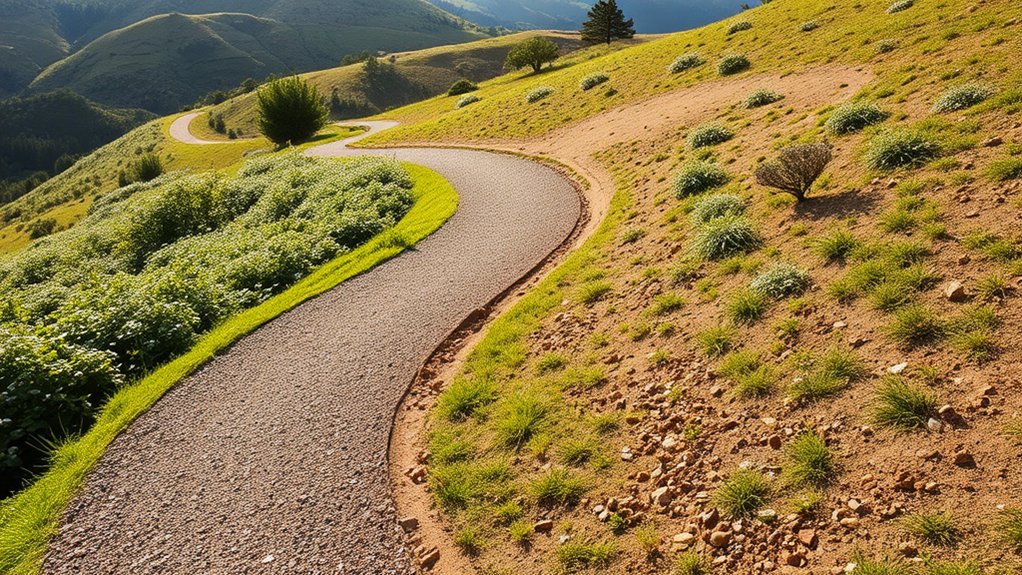
Compliance With Sustainable Urban Drainage Systems
Resin-bound gravel surfaces play a vital role in meeting UK drainage regulations whilst supporting modern urban water management.
These surfaces deliver three essential SUDS benefits:
- Permeability: The surface lets rainwater soak through naturally, much like a garden lawn, cutting surface water runoff.
- Pollution Filtration: Works like a natural filter, trapping pollutants from cars and urban debris before they reach groundwater.
- Flood Risk Reduction: Manages heavy rainfall effectively, reducing puddles and surface flooding common on traditional paving.
Choosing resin-bound gravel for driveways, car parks or pathways ensures SUDS compliance whilst protecting local water systems.
It’s a practical choice for both residential and commercial projects, particularly in areas prone to flooding or where councils enforce strict drainage requirements.
Long-Term Performance in Various Weather Conditions

Understanding how resin-bound gravel performs in British weather is crucial for hillside installations. The material proves remarkably durable, resisting cracks and staying firm even with regular vehicle use. It handles our varied climate well – from winter frosts to summer heat – without breaking down.
The surface works brilliantly in typical UK conditions, allowing rainwater to drain through rather than forming puddles or washing away the surface. Think of it like a robust sponge that stays put. It’s particularly useful for slopes where water management is vital.
Built-in UV protection guards against sun damage (even in our limited sunshine), while grip-enhancing additives keep it safe in wet weather and frost – much like winter tyres on a car.
With correct installation and basic upkeep, resin-bound gravel offers a lasting, smart-looking surface that tackles British weather head-on.
Frequently Asked Questions
How Is Resin-Bound Gravel Installed on Steep Slopes?
Installing resin-bound gravel on steep slopes requires careful planning and proper technique. Start at the slope’s bottom, working upwards in manageable sections – much like tiling a wall. The sub-base must be exceptionally stable, typically using a reinforced concrete foundation. Level each section thoroughly before applying the resin mixture, and trowel with firm, consistent pressure to achieve an even 18mm depth. For particularly steep gradients, consider adding an anti-slip aggregate to enhance grip, similar to what you’d find on public footpaths.
Can Resin-Bound Gravel Support Heavy Vehicles?
Resin-bound gravel can indeed support heavy vehicles, but proper installation is crucial. The key lies in the sub-base – you’ll need a solid foundation of MOT Type 1 aggregate, properly compacted to the correct depth. For domestic driveways expecting regular car traffic, an 18-20cm sub-base typically suffices. However, for areas handling lorries or heavy machinery, a deeper base of up to 30cm may be required, along with additional reinforcement. Professional installation ensures the surface can handle substantial weight without cracking or shifting.
What Types of Aggregates Can Be Used?
Different aggregates suitable for resin-bound gravel include quartz, granite and limestone. These materials come in various colours and sizes, offering both practical durability and kerb appeal for your driveway or path. Commonly used British options feature Cotswold stone and Scottish granite, which prove particularly hard-wearing in our climate.
Is Resin-Bound Gravel Eco-Friendly?
Resin-bound gravel offers better environmental credentials than many standard surfacing options. Its permeable nature allows rainwater to drain naturally into the ground, helping prevent local flooding and supporting natural water cycles. Unlike concrete or tarmac, it doesn’t create water run-off problems for drains and sewers, making it a practical choice for British gardens and driveways.
How Does Resin-Bound Gravel Enhance Property Value?
Resin-bound gravel boosts your property’s value by offering a premium, contemporary finish that British homebuyers particularly value. Much like a well-fitted kitchen or a maintained garden, this durable surface adds kerb appeal whilst requiring minimal upkeep. Unlike traditional gravel that shifts and scatters, resin-bound surfaces stay neat and tidy year-round, making your property more attractive to potential buyers and estate agents alike.
Conclusion
Resin-bound gravel stands out as the smart choice for hilly landscapes across the UK, offering excellent drainage and lasting durability. The surface can reduce water runoff by up to 90%, a crucial benefit given our rainy climate. Perfect for steep driveways and garden paths, this material meets sustainable urban drainage requirements whilst providing a smart finish that withstands British weather year-round. It’s both practical and attractive – a worthwhile investment that delivers long-term value for any sloped outdoor space.
